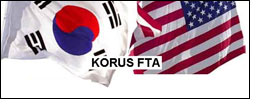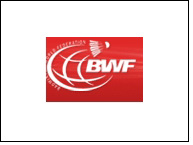 Hedvig
Hedvig Flávia Linden
Flávia Linden Mc kenneth Licon
Mc kenneth Licon Martina M
Martina M Robbie W
Robbie W

The Republic of Korea-United States Free Trade Agreement (KORUS FTA) has been ratified by the National Assembly of South Korea, thus taking a step closer towards its implementation form January 1, 2012.
The KORUS FTA was signed in 2007, and since then the accord had been awaiting approval from legislative houses of both the countries. In October 2011, the bill was passed by the US Congress and was later signed into law by President Barack Obama.
The implementation of KORUS FTA would make it the biggest US trade pact since the coming into force of the North American Free Trade Agreement (NAFTA) in 1994.
For South Korea, the pact would make it the only country to have such a trade agreement with the world's three major economic blocs. South Korea already has FTA in place with the European Union (EU) and the Association of South East Asian Nations (ASEAN).
The South Korean Government is expecting that the trade accord would significantly boost its economy and result in the creation of 350,000 new employment opportunities in the country.
The Trade Ministry estimates Korea’s exports to the US to rise at an annual average of US$ 1.285 billion during the next 15 years. It also projects the imports from the US to increase by US$ 1.147 billion per annum, resulting in improvement of Korea’s trade balance with the US by US$ 138 million every year.

Taiwan-based Shinkong Synthetic Fibers Corp will be starting the operations of a new PET resin plant by the end of this year, which will be more than double the current capacity.
"The current output of PET bottle resin is 190,000 tons per year. By the end of this year, new capacity will be operational, which will take our total PET capacity to 400,000 tons per annum", a Shinkong company official told fibre2fashion.
Giving the details about current PET bottle resin prices he said, "We are currently offering at US $1,500 / ton (FOB Keelung – Taiwan). Our regular customer bid is at US $1,490-1,510 / ton (FOB), depending on different grades.
Shinkong Synthetic Fibers Corporation founded in 1967, subsequently developed into a joint venture with Toray Industries and Mitsubishi Corporation.
Its three plants in Taiwan totally produce 1,900 tons of polyester products per day. Additionally, the company also has manufacturing sites in China and Thailand.
 The British baby care brand, Babyglow, which produces patented baby clothes with a capacity to monitor temperature, officially launched the brand in China, last week.
The British baby care brand, Babyglow, which produces patented baby clothes with a capacity to monitor temperature, officially launched the brand in China, last week.
The firm is still remembered for its participation in UK's television show "The Apprentice" during the end part of 2010, as the show then set new viewership records.
The commercial consultants of the brand pushed it to explore the Chinese markets in its initial development stages, as the single child policy and the significance of this market for the present as well as future world economy, makes it a unique destination for a brand like Babyglow.
The brand targeted the vital Mother-Infant-Child Products Fair in Beijing for its launch. Chris Ebejer, originator of the brand, paid a special visit to China for launch of the brand there, and gave six television interviews, of which some were transmitted live across the nation and were simultaneously screened on big screens at the fair.
The company has now started shipping the iconic temperature monitoring suits to the stores in China, which had booked advance orders for the same, before the fair.
The United Clothing and Textile Association (UCTA) has been informed that the Bargaining Council is currently undertaking operations to shut down at least six factories in New Castle. Such action will impact 2000 workers. Our information is that the majority of workers who are being affected are not in favour of the factories being closed. It is also clear, that this is a systematic and specific target campaign towards the New Castle Chinese Chamber of Commerce and Industry who has been a needle in the side of the clothing union Sactwu.
The United Clothing and Textile Association regrets the statement made by Patrick Craven of Cosatu, in his May Day Message. The United Clothing and Textile Association has never encouraged its members to relocated to neighbouring countries. The clothing union has been aware for a long time that this is one option for employers if no amicable solution is found. However, we do find it hypocritical that Cosatu finds the space to criticize the UCTA when its affiliate, SACTWU, has financial interests in a clothing company that has manufacturing plants in Lesotho.
The United Clothing and Textile Association still firmly believes that there is an opportunity to find an amicable solution to this ongoing issue facing the clothing sector. The stance of United Clothing and Textile Association is to find mechanisms and space to work in collaboration with the union and bargaining council. UCTS believes if such collaborative mutualism can be found, jobs will be saved, and business development in the clothing and textile sector encouraged.
The United Clothing and Textile Association have always maintained that the current impasse is more than just wages.
The United Clothing and Textile Association will be monitoring the developments closely and engage with its members as this situation unfolds. We sincerely hope that further factory closures can be stopped and the concerned parties can meet and discuss the situation in an amicable and honest manner where all parties can apply their collective minds to a feasible solution that will make the clothing and textile sector a vibrant contributor to the economic success of South Africa.
 Obscene Jeans Corp announced the signing of a letter of intent to engage a Communist Government Fully-Licensed Chinese trade company to import, distribute and market OBJE products in China and Greece.
Obscene Jeans Corp announced the signing of a letter of intent to engage a Communist Government Fully-Licensed Chinese trade company to import, distribute and market OBJE products in China and Greece.
Fully-licensed import/export entities that are authorized to service and distribute American and European products on the Chinese mainland are typically scarce. According to the LOI, Obscene Jeans is working on an agreement to make Beijing Beautyfresh International Trade Company Ltd. (Beautyfresh) the distributor of OBJE-branded products in China under Beautyfresh's valid import/export license. Additionally, OBJE seeks to engage Beautyfresh to use its import/export experience and business contacts to distribute and market the company's forthcoming cosmetic and beauty products in Greece.
Obscene Jeans is currently formulating a global business plan for a product line that could soon grow to include an expansive line of women's denim, casual apparel, fragrances and rejuvenating cosmetics. OBJE President and CEO Robert Federowicz said Monday that a distribution agreement with Beautyfresh would represent the first step in the company's plans to organize a worldwide network of licensed distributors designed to market the company's jeans and lifestyle products to fashion consumers on every continent.
"China and Greece are only the beginning," Federowicz said. "We are working hard to build relationships with distributors across the globe to make Obscene Jeans a true force in the international style community. We expect to reach agreements with many more distribution companies in the very near future."
Beautyfresh is best known in China for its line of all-natural luxury soaps made using Greek olive oil and other beauty products. According to the letter of intent, the company will have a due diligence period of 30 days to present OBJE with a proposed import/export and distribution plan.
In the meantime, Federowicz is focused on presenting a sneak peek at Obscene Jeans' new denim line in Las Vegas on May 4. There, designer Rachel Stark-Cappelli will unveil OBJE's fabulous and radical coupling of high-fashion denims and eye-popping metallic mesh crafted to accentuate the female form as no other jeans dare.
"We think the women of the world are ready for bold new designs that incorporate incredible new textures into the hottest denim styles to create a fuller sensory experience," Federowicz said. "Las Vegas will get the first look, but hardly the last. Our goal is nothing short of world domination."
Obscene Jeans produces eye-popping denim fashions for the world's sexiest women. The company competes in the fashion sector alongside True Religion Apparel, Inc, Phillips-Van Heusen Corp, Hanesbrands Inc and Polo Ralph Lauren Corp.
Obscene Jeans (OBJE) is an OTCQB publicly traded company. OTCQB is the middle tier of the OTC market. OTCQB companies report to the SEC or a U.S. banking regulator, making it easy for investors to identify companies that are current in their reporting obligations. OBJE is a progressive lifestyle and apparel company dedicated to developing forward-thinking fashion trends and lifestyle accessories.
Wanzhou District in Chongqing has signed an agreement with the Shandong Ruyi Group to construct a Textile City at an investment of 15 billion Yuan.
Of this, 10 billion Yuan will be invested in the construction of industrial and support projects while 5 billion Yuan will be used in construction of commercial housing projects.
The city named "Western Textile City" will be built on 3,500 mu of land and the whole investment will be made by Shandong Ruyi Group.
The Textile City is located in the National Economic and Technical Development Zone of Wanzhou.
After completion, the city will be able achieve yearly sales of 50 billion Yuan, pay industrial taxes amounting to about one billion Yuan, and create 100,000 jobs.
 China Linen Textile Industry Ltd, a China-based company engaged in the production and sale of linen yarn and various types of linen fabric, announced Mr. Xu Jianzhong and Mr. Xu Jixiang have joined China Linen's Board of Directors, effective April 20, 2011 and Mr. Teng Yunhai has resigned as director of the Board of the Company.
China Linen Textile Industry Ltd, a China-based company engaged in the production and sale of linen yarn and various types of linen fabric, announced Mr. Xu Jianzhong and Mr. Xu Jixiang have joined China Linen's Board of Directors, effective April 20, 2011 and Mr. Teng Yunhai has resigned as director of the Board of the Company.
"It is our pleasure to have Mr. Xu Jianzhong and Mr. Xu Jixiang join China Linen's Board of Directors. They bring firsthand experience in the textile industry to our board," said Mr. Gao Ren, Chairman and CEO of China Linen. "We look forward to them helping us improve our corporate oversight and governance policies, increasing our transparency to the investment community. The appointment also brings China Linen a step closer to meeting the requirements for being listed on a major US stock exchange."
Along with the appointment of the new directors, the Board established the Audit Committee, the Compensation Committee and the Nominating Committee of the Company. Upon establishment of the three committees, the Board appointed Mr. Stephen Monticelli as chairman of the Audit Committee and member of the Nominating Committee and the Compensation Committee. The Board appointed Mr. Xu Jianzhong as chairman of the Compensation Committee and member of the Nominating Committee and the Audit Committee. The Board also appointed Mr. Xu Jixiang as chairman of the Nominating Committee and member of the Audit Committee and the Compensation Committee.
Mr. Xu Jianzhong, 51, is a professor and PhD supervisor at Harbin Engineering University, School of Economics and Management since March 2005. He also served as vice president of School of Economics and Management from March 2005 to March 2006. He has participated in over 20 national or provincial research projects and his studies and researches focus on development and competitiveness of enterprises. Currently he also serves as an expert on Heilongjiang Province Science and Technology Advisory Committee, executive director and secretary general of Heilongjiang Academy of Management and vice president of Heilongjiang Academy of Business Administration. Mr. Xu Jianzhong received his Bachelor of Science, Master of Economics and PhD in Management from Harbin Engineering University in 1982, 1992 and 2003, respectively.
Mr. Xu Jixiang, 56, has over 30 years' experience in the textile industry. He has served as president of China Linen Textile Industry Association since December 2009. From December 2008 to December 2009, he was the director of the Industry Department of China Textile Industry Association. From January 2006 to December 2008, he was the chairman of China Textile Technology Development Co., Ltd. Mr. Xu Jixiang received his Bachelor of Science in cotton textile from Donghua University (formerly, China Textile University) in 1978.
There is no family relationship between the new directors and any of our other officers and directors.
 Badminton's new clothing regulations, part of an overall campaign to raise the profile of women in Badminton and profile of the sport, will be implemented on 1 June 2011, granting Member Associations and players another month to adapt to the new ruling.
Badminton's new clothing regulations, part of an overall campaign to raise the profile of women in Badminton and profile of the sport, will be implemented on 1 June 2011, granting Member Associations and players another month to adapt to the new ruling.
The Badminton World Federation (BWF) has received feedback from various parties with regards to the introduction of Rule 19.2 of the General Competition Regulations which require female players to wear skirts or dresses for Level 1 to 3 tournaments. This specific regulation has its genesis in the extensive review into the marketing and events structure conducted by an external international marketing agency in 2009.
The BWF has developed guidelines to go alongside the new Regulation, to ensure that it will not in any way discriminate against any religious or other beliefs and respects women. Players will continue to wear shorts if they wish but simply wear a skirt over the top of the shorts, as is often practiced already by some players.
Many players have supported the intention of the rule, but some have asked why it is necessary to make a regulation.
"Sometimes it is necessary to make rules to get a consistent implementation. BWF have for many years encouraged both Badminton clothing manufacturers and players to produce and wear clothing that would enhance the presentation of the game in general," said BWF Deputy President Paisan Rangsikitpho.
"We are however always willing to listen to the players, which is why we have decided to delay the implementation date slightly to 1 June to be able to advise and have a dialogue with the players on the implementation guidelines."
Rangsikitpho also added that the one-month extension will provide an opportunity for its Members to fully understand the reasons behind the new rule leading up to its 28 May AGM in Qingdao, China.
The new rule was supposed to be enforced on 1 May 2011. But with the one month extension, the first tournament with these rules will therefore be in June at the Singapore Open, part of the OSIM BWF World Superseries.
Some of the steps already initiated to raise the profile of women in Badminton are offering equal prize money for men and women disciplines, standardized 21-point rally system for men and women disciplines and equal male and female participation across the events offered – men's singles, women's singles, men's doubles, women's doubles and mixed doubles.
Former world champion Nora Perry, who also heads the BWF Women in Badminton Working Group, welcomed the new rule.
"I am thrilled to be part of putting the women's game higher on the agenda in the BWF. And the new clothing regulations are one of the tools that can help create a better presentation and more distinct profile of the women's game", said Perry.
"We need to be able to differentiate the women's game to create the attention that the women's game deserves. Being a woman myself I do not think that the rules in any way discriminate against women. The rules give sufficient room for the players to chose comfortable clothing and still be living up to the intentions of the regulations."
The Badminton World Federation (BWF) is the governing body for the sport of badminton and has its headquarters in Kuala Lumpur, Malaysia, with an office in Lausanne, Switzerland.
Daigee Shaw, an eminent scholar and President of the Chung-hua Institution for Economic Research, has ruled out the conception that Taiwan's petrochemical industry would be hit if the country fails to retain Kuokuang project.
He while quoting this notion to be "fundamentally wrong", said that, there is no need for Taiwan to expand its petrochemical industry, as presently even the county well meets, the domestic demand for ethylene.
He said that, the sizeable sum that Taiwan has invested in its petrochemical industry over the last few decades has already paid out in the form of a constant and adequate supply of ethylene, and now when the number of downstream petrochemical businesses is reducing, the country does not require one more oil refinery to enhance ethylene production.
Shaw stated this while speaking at the fifth meeting held to study the ecological effects of the controversial Kuokuang petrochemical complex, which is in a controversy over allegations that the plant could cause large scale environmental destruction.
Further, in spite of the fact that, a report released in the Oil and Gas Journal in 2010, placed Taiwan at ninth position in global ethylene production and at seventh position in per capita ethylene production, according to Shaw, the domestic petrochemical businesses would grow more competitive, if the government withdraws the subsidy provisions and drive these businesses to evolve more efficient and non-polluting production techniques.
The industry can become even more lucrative if it engages in production of high-value items like paints and polymer additives, he added.
Presently, Taiwan's petrochemical industry remains greatly focused on production of synthetic fibres, plastics and rubber, which according to Shaw's analysis, deliver low value and generate lesser profits.
Shaw said the government should abandon the Kuokuang project, at once, and added that, considering the sustainable development perspective, the need is to divert Taiwan's petrochemical industry policy from volume-based to value-based.
 Street Star Lifestyle Brand, a Philadelphia based clothing label, has set their sights on expanding distribution of their line throughout the nation and into Canada. They are currently in negotiations with select high-end boutiques and online retailers to carry the label. They have partnered with experienced sales reps and select showrooms and have put together a rigorous nationwide marketing campaign to increase awareness of their exclusive brand.
Street Star Lifestyle Brand, a Philadelphia based clothing label, has set their sights on expanding distribution of their line throughout the nation and into Canada. They are currently in negotiations with select high-end boutiques and online retailers to carry the label. They have partnered with experienced sales reps and select showrooms and have put together a rigorous nationwide marketing campaign to increase awareness of their exclusive brand.
Street Star redefines and interprets self expression in creative, abstract and interesting ways. They focus on quality, style and individuality and represent a rebellious and free-spirited way of life. Anyone from celebrities and reality stars to the most hip and trendy individual has been seen wearing their garments.
Currently, their online retail sales are worldwide, with customers in Canada, the United Kingdom, Germany and Denmark. They will continue to remain exclusive by being very selective about who carries the brand. Each stockist is hand selected by the owners themselves to ensure a true fit for appreciation of their garments.
As an emerging label, they are working diligently to create a brand that is the true embodiment of self-expression and style. Street Star's most recent endeavor, a line of children's clothes, is in the development phase and promises to be just as original and exclusive as their current collection. Street Star will also be adding more limited edition dresses and mini skirts to the women's collection and are currently in negotiations to create a line of leather cuff bracelets.
"We don't just make t-shirts, we invest time and passion into everything we create" says designer, Bobby Scalia. Depending on the amount of detailing involved, one shirt can take anywhere from one hour to 24 hours to construct. The clothing is created by an artistic process rather than by a strictly mechanical one. Using only the finest materials, they hand craft every garment with meticulous detail. Because the number of multiples is limited, their clothing is sought after by the most fashion conscious individual.